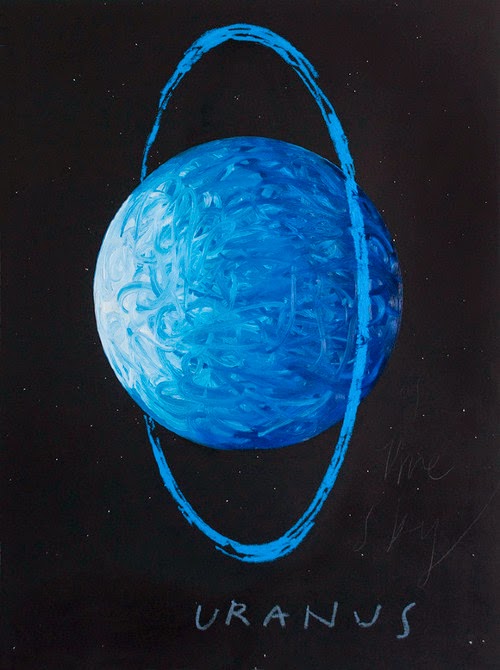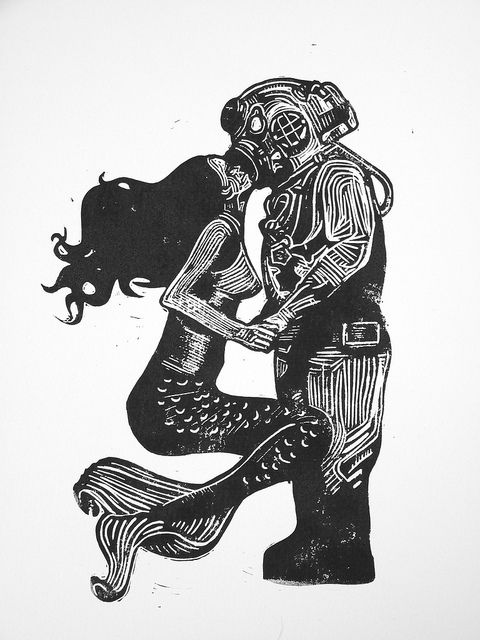
Neptune in Aquarius: Romanticized the Idea of Progress Itself
 Neptune in Aquarius! A slippery, star-soaked fish swimming through a sign that’s basically the headquarters of sci-fi idealism and techno-utopian dreams. From 1998 to 2012, Neptune sashayed through Aquarius, making its way through the circuitry of the human collective. And what did we get? The rise of social media, a digital realm of avatars and algorithms. Facebook, Twitter, and the internet. Aquarius is a starry-eyed sign of rebellion and radical reconfiguration. Neptune is the mystic, coating everything in glitter, illusion, and transcendent yearning. So naturally, under Neptune’s influence, our collective idealism was uploaded into the cloud. We dreamed of a connected world, and we got it—but with pop-ups, surveillance, and targeted ads. A utopia, but one with cookies (and not the edible kind).
Neptune in Aquarius! A slippery, star-soaked fish swimming through a sign that’s basically the headquarters of sci-fi idealism and techno-utopian dreams. From 1998 to 2012, Neptune sashayed through Aquarius, making its way through the circuitry of the human collective. And what did we get? The rise of social media, a digital realm of avatars and algorithms. Facebook, Twitter, and the internet. Aquarius is a starry-eyed sign of rebellion and radical reconfiguration. Neptune is the mystic, coating everything in glitter, illusion, and transcendent yearning. So naturally, under Neptune’s influence, our collective idealism was uploaded into the cloud. We dreamed of a connected world, and we got it—but with pop-ups, surveillance, and targeted ads. A utopia, but one with cookies (and not the edible kind).
Online identities became as valid—if not more so—than physical ones. The “collective” found its playground, but Neptune ensured it was full of both inspiration and fantasy. Now, as Neptune hovers in these critical degrees, on the cusp of departing Aquarius, we’re left questioning the legacy: Did our digital dreams deliver transcendence or just distraction? Was the revolution televised—or merely streamed?
From the late ’90s through the early 2010s, this alignment began to change the way we imagined connection. Aquarius, our oddball prophet of progress, isn’t concerned with small talk or pleasantries—it wants to know how to wire a better future, how to reroute the current of humanity toward liberation, intellect, and unity. And Neptune, slippery fish that it is, infused its ambition with a misty idealism, a yearning for something sublime. What emerged was the dawn of the digital dream—an era where we imagined the internet could save us, where online forums and social networks seemed like modern-day oracles. The ideal was intoxicating. A borderless world of shared information, virtual communes of thought, the promise of equality in cyberspace. For a moment, it felt like we were building a new Eden from code. But as this transit matured, the shadow revealed itself. The promise of technological liberation began to morph into digital dependency. The decentralized dream became re-centralized in the hands of a few billionaires who understood Neptune’s glamour better than anyone—who built digital spaces so seductive, we didn’t notice the walls going up around us. What was billed as a revolution in freedom became a stage for curated identities, surveillance capitalism, and infinite scrolls into apathy.
Now we find Neptune poised at the final degrees of Aquarius, it’s a poignant moment, because we’re saying goodbye to a planetary placement. And We’re standing on the precipice of collective reflection. What did we gain from these years of virtual idealism? And what did we lose in the vapor trail of our utopian visions? Neptune leaves us no clean answers. It prefers riddles, metaphors, glimpses behind the veil. But we feel it, don’t we? The great work now is integration—taking the Aquarian blueprint and grounding it in something more human. As Neptune slides toward Pisces, its home turf of spiritual surrender and oceanic unity, the challenge will be to bring heart to what was once merely mind, to temper intellect with compassion, and to turn data into meaning.
The Mythic Depths
Now we’re plumbing the truly mythic depths of the universe. This is no casual celestial encounter. During the mid-2000s, as these two intertwined their energies, we saw the merging of radical innovation with emotional dissolution. A time when the boundaries of self, society, and spiritual identity grew porous, and the digital realm became a mirror. Neptune, the dreamer, softens everything it touches. It melts, it seeps, and it seduces. It washes away harsh edges, creating space for visions and ideals. And in Aquarius, it romanticized the idea of progress itself. It longed for better technology—but it also dreamed that humanity would evolve, connect on some higher frequency, rise above the material and dissolve into a new kind of togetherness. And yet, Neptune is notorious for selling dreams that shimmer beautifully from a distance but vanish when touched.
So, what happens when these two (Neptune and Aquarius) co-create from across the zodiac, both urging the collective to change, to transcend, to innovate—but doing so through entirely different means? Neptune says: “Dream a better world.” Aquarius replies: “Tear down the walls between this one and the next.” Together, they fueled an era where the imagination exploded into being at a pace previously unimaginable. The rise of social media during this period was a spiritual event. The birth of Facebook, Twitter, YouTube—these were dream spaces. Identity became performative, fragmented, shareable. Connection was instant, but also thin, stretched across the globe like a digital veil. We could see and be seen like never before, but what was it we were really looking at?
Idealism surged—”Yes we can,” they said, and many believed. At the same time, conspiracy, confusion, and the manipulation of reality through imagery and sentiment bloomed like algae in murky waters. The boundary between truth and fantasy eroded. And in fashion, in art, in pop culture, we saw the same patterns—fantasy aesthetics, tech fetishism, ironic detachment, sincerity buried beneath layers of hyper-awareness. The era was not without its beauty. It gave us glimpses of a more interconnected, creative, emotionally open world. But it was also a time of profound vulnerability. And now, as that chapter nears its close—Neptune drifting out of Aquarius—we are left with the afterglow. The apps remain. The networks persist. The dreams linger. But the innocence of that digital dawn is gone. We’ve seen what connection without depth can do, what dreams without discernment can become.
Humanity High on Possibility
Aquarius, being fixed air, wants to think its way to utopia. It doesn’t melt like Pisces or conquer like Aries—it envisions. It believes that with enough data, discourse, and dispassion, we can transcend the baser instincts and create systems that actually work. Enter Neptune, who doesn’t care for systems at all but adores dreams. Together, they forged a cultural climate of imaginative pragmatism—oxymoronic perhaps, but deeply influential.
During this period, the collective eye turned outward and upward. Neptune in Aquarius made it fashionable to care. Climate change, gender fluidity, racial justice, mental health—these weren’t fringe issues anymore; they were part of the mainstream, often through stylized activism that blurred the line between performance and progress. But let us not be cynical. Performance is still a form of participation, and awareness is a seed.
We also saw a reconfiguration of political identities. The old left-right binaries began to dissolve under the Piscean mist of Uranus while Neptune, with Aquarian flair, encouraged experimentation in governance, ideology, and organization. These were eruptions of Aquarian rebellion, but their fuel was emotional, spiritual, even mystical. People were awakening. Though the forms that followed didn’t always sustain the vision, the vision itself mattered. It showed us what we could want, even if we didn’t yet know how to get it.
Science, too, became a kind of gospel during this transit. Science imbued with idealism. Think of the rise in citizen science, space exploration as public spectacle, and the cultural lionization of figures like Elon Musk (before the sheen wore off). There was an almost religious devotion to innovation, a belief that we could engineer our way out of suffering. It was Aquarius channeled through Neptune’s longing for salvation. But detachment, one of Aquarius’s great virtues, also brought challenges. In the glare of global crises, many adopted the stance of the informed but emotionally armored observer—retweeting justice, streaming pain, but rarely touching it directly. This detachment can lead to knowledge, but also to alienation, to the sense that we are watching the world from behind glass. Neptune loves a screen, after all.
And yet—there was progress. Not always clean, not always consistent, but movement nonetheless. The seeds planted in this time are still blooming, albeit in strange, hybrid forms: digital communities organizing mutual aid, AI being used to model sustainable futures, younger generations questioning every construct handed to them like little Aquarian revolutionaries born with broadband in their blood. So what are we left with, now that Neptune prepares to exit this rarefied airspace? A planet more aware of itself, perhaps. Not healed, not perfect—but aware. Aware that science and spirit, technology and compassion, revolution and reason, do not have to live on opposite ends of a spectrum. They can co-exist. They can inform one another. They can dream together.
The Digital Mystic
Consider the exquisite irony: Aquarius, the water bearer, pours out knowledge—not water—and Neptune, lord of the seas, floods that information into every crevice of human life. The cosmos was conspiring to baptize the modern mind in hyperlinks. And what better vessel than the World Wide Web, whose very acronym—WWW—visually mirrors the zigzag lines of the Aquarius glyph, even the sky itself left its signature on this new chapter of civilization? This was technological progress, and it was also the embodiment of an ideal. The WWW was built for connection. It was meant to be a living library, a global agora, a shared project of thought and imagination. Anyone, anywhere, could upload an idea into the ether, and it would ripple out, touching lives, igniting minds. It is Neptune’s glamour, wedded to Aquarius’ collective intellect: a dream of unity through information, of enlightenment through accessibility. The internet redefined community. Under this transit, we discovered that one could belong to a tribe without ever meeting its members in person. We formed bonds across borders, identities across platforms, revolutions from laptops. This is Aquarian collectivism taken to its highest frequency: not confined by geography, not limited by tradition, but endlessly recombinant, a kaleidoscope of shared thought. And yet, true to Neptune’s nature, there was always a mirage in the matrix. While the Web offered liberation, it also bred illusion. The lines between truth and fiction blurred. Ideals became memes; causes became trends. We connected, but were we connecting more deeply, or just more frequently? Neptune never grants its gifts without wrapping them in mist. And so even as we reached for enlightenment, we often found ourselves lost in distraction, overwhelmed by information, numb from the sheer velocity of virtual life.
Still, the spiritual architecture of the internet bears the mark of this transit. It’s no accident that movements for global awareness, environmental activism, decentralized knowledge, and digital democracy all surged during this period. The Web became a theatre for the Aquarian dream—the belief that humanity, when connected, can rise above its divisions and collaborate toward something greater. So what are we to make of this now, as we stand a decade removed from Neptune’s departure from Aquarius, reflecting on the network it helped inspire?
Perhaps the greatest insight is that we were given a mirror, a magical one, reflecting who we could be. The World Wide Web was about potential. It was about reimagining the boundaries of self and society. And it was about weaving together billions of souls into something—dare we say it—Aquarian: an interconnected human consciousness, flickering in fibre-optic threads across the Earth. We are still learning how to live inside this vision. Still testing the limits of what it means to truly collaborate, to truly share. But Neptune gave us the dream, and Aquarius the circuitry. What we do with it now… well, that’s the next chapter of this story.
A Technological Evolution
What occurred in that glittering window from 1998 to 2011/12 wasn’t simply the spread of internet access—it was the rebirth of the imagination in digital form. Neptune, ever the spinner of dreams and dissolver of boundaries, infused the stark rationalism of Aquarius with something ethereal. And the result? The internet, once a text-heavy bulletin board of rudimentary data, bloomed into a lush, immersive dreamscape. We entered an age where words danced with images, where video became the new verse, and where animation, design, and sound coalesced into living, breathing multimedia experiences. This was a conjuring.
We were no longer just reading or writing—we were immersing. Stories became visual feasts, ideas became viral phenomena, and the act of expression itself became theatrical, performative, shared in real time. It’s Neptune’s style, isn’t it? To seduce us into new realms with beauty. Through platforms like YouTube, Flickr, Vimeo, and early social media, we began to tell our stories in layers—the feeling, the aura, the soundtrack of our lives. And the people responded with a hunger that surprised even the technocrats. We wanted depth. And Neptune gave it to us, pixel by pixel, in dreams that could be downloaded.
Then came the revolution of mobility—the final flourish in this era’s grand unveiling. Wireless internet was no small thing. It unshackled us from desks and cables, from being physically rooted to a place in order to be connected. It was Aquarian liberation made real: freedom through innovation, knowledge without geography. And Neptune loved this. What could be more fluid, more boundary-dissolving, than internet access flowing invisibly through the air, touching phones, laptops, and eventually the very fabric of public life?
The rise of mobile internet was nothing short of Promethean. Suddenly, the dream was in your pocket, communicating to you on buses, in cafés, at protests, in bedrooms. You carried the world with you, and in a Neptunian twist, the world began to carry you. Our identities became more diffuse, more dependent on connection, more intertwined with a digital self that existed alongside, or even above, the physical. Time and space collapsed. You could have a conversation across continents in a moment. You could learn a language on your lunch break. You could fall in love via emoji. The gods of old would have wept at the sheer magic of it—though, true to Neptune’s trickster nature, it came with a cost.
With the blending of boundaries came confusion: What’s real? What’s curated? Who am I, when I’m filtered, posted, archived? But let’s not lose ourselves in cynicism. Neptune in Aquarius was about potential. And this era gave us unprecedented access to our own creativity, our own voices, and our own communities. It allowed us to dream collectively, to tell stories in chorus. The digital realm became a new psychic terrain—borderless, imaginative, democratic in theory if not always in practice.
The Dream Factories
Cinema, under this astral alliance, became something alchemical. We were no longer pointing a camera at a scene—it became about conjuring entire realities, digitally woven yet emotionally potent. CGI, once a gimmick or a novelty, became the very tool of modern mythmakers. And right at the dawn of Neptune’s Aquarian voyage came a cinematic oracle: The Matrix. A film not just about technology, but of it and through it. The Matrix was more than a film—it was a philosophical awakening wrapped in black leather and slow-motion gunfire. It tapped directly into the Aquarian archetype of the rebel-visionary and merged it with Neptune’s love of blurred realities.
The simulated world it portrayed was a literalization of the internet’s emerging power, a cinematic divination of our shifting relationship with truth, identity, and control. It asked, “What is real?”—a Neptunian question if ever there was one—and answered it with cyberpunk spectacles, hacker prophets, and an aesthetic that would ripple through fashion, music, and philosophy for years to come. And it wasn’t only The Matrix. Films like Avatar, Inception, Minority Report, and The Lord of the Rings trilogy all emerged during or shortly after Neptune’s Aquarian sojourn.
Each in their own way played with perception, constructed vast digital worlds, and asked us to reconsider the nature of reality, memory, and connection. It was as if cinema had become a dream that dreamt itself—a perfect Neptunian phenomenon delivered via Aquarian tools.
Meanwhile, in the music world, a similar transmutation was unfolding. The very way we listened to music changed. The move from physical media to digital formats—from CDs to MP3s, to streaming platforms—was a technological upgrade. It was also a fundamental change in our relationship with sound and meaning. Music became weightless, omnipresent, shared in airwaves and data streams. Genres blurred. Electronic music flourished. Artists like Radiohead, Björk, Daft Punk, and later Kanye West (in his more experimental incarnations) channeled a kind of futuristic melancholia—a blend of circuitry and soul.
Music videos became cinematic epics, with CGI and digital aesthetics offering new ways to express emotional depth and social critique. Neptune infused everything with atmosphere; Aquarius ensured the tools could keep up. And let’s not forget the rise of remix culture, of mashups, of digital sampling. This was not music as collage—shifting, fluid, collaborative, collective. The Aquarian model of shared concepts manifested here in full force, while Neptune’s penchant for emotional resonance made these reassembled fragments feel whole, even holy. What’s remarkable is how this era set the stage for the streaming culture we now take for granted. Neptune in Aquarius changed what we watched and listened to. It also changed how we related to those experiences. Art became more immersive, more accessible. It lived in the cloud, in playlists, in clips and GIFs and ambient loops. It was Neptune working its magic through the touchscreen. We were dreaming together, en masse, in surround sound and 3D. And whether or not we fully understood the spell we were under, it changed us—permanently.
The Disembodied World
The hallmark of Neptune in Aquarius: a boundary-dissolving baptism of technology that turned passive consumers into participants in a grand, digitized drama. Let’s start with the Wii—Nintendo’s revolutionary little console that did more than play games. It broke the fourth wall between body and screen. Prior to its release, gaming had largely been about thumbs and reflexes. But the Wii said, “Move.” It beckoned players off the couch, demanding they swing, point, twist, and dance. It turned the living room into a stage and the player into a performer. This was no longer escapism—it was embodiment. The virtual bled into the physical.
This shift, subtle but seismic, reflected Aquarius’ penchant for innovation and Neptune’s desire for absorption. The Wii was ritual. It brought families together, made games more inclusive, accessible, even spiritual in their joyful physicality. Suddenly, technology was a mirror in which to see ourselves moving, reacting, existing in space. This was interactivity as intimacy.
Meanwhile, the written word, our most ancient form of storytelling, found itself under siege by velocity. The rise of blogs and digital news offered convenience; they also rewired our relationship with information itself. Books, our time-honored vessels of slow contemplation, began to feel like they were from a slower age. Newspapers folded—literally and metaphorically—while blogs, born of Aquarian individuality and Neptune’s craving for immediacy, multiplied like wildflowers. The internet became the new library, but also the new confessional, the new printing press, the new marketplace of thought. Anyone with a keyboard became a publisher. Anyone with an opinion could find an audience. The gatekeepers of information were quietly overthrown, and in their place emerged an army of digital scribes, chronicling everything from war zones to what they had for breakfast.
Neptune, ever the dissolver of boundaries, took one look at the paperbound world of literature and said, “What if books were clouds?” And Aquarius, with its gift for circuitry and innovation, made it so. The rise of the e-book, and specifically the triumph of the Kindle was a spiritual shift. We watched, fascinated and slightly uneasy, as the object of the book—tactile, scented with ink, thick with history—was transformed into a glowing screen that could carry an entire library in one hand. It was minimalist, it was modern, and it was quintessentially Aquarian: a practical utopia for the information age. Kindle was a cultural statement. It said, “You don’t need shelves to be well-read. You don’t need paper to turn a page.” And Amazon, the high temple of modern commerce, became the oracle through which these digital words flowed. It was liquid literature, shifting from servers to screens, accessible instantly, anywhere. A miracle of distribution, but also a subtle dismantling of the book as artefact.
For Neptune in Aquarius, this was the perfect ending note. After transforming the way we listen to music, engage with films, play games, and consume news, it turned its attention to the last great bastion of traditional media—and made it fluid. This was a transfiguration. The stories were still there, but the way we accessed them had changed utterly. The library, a cloud. We could recommend a book with a click, read with strangers across the globe, annotate in real-time, share insights digitally. Neptune, with its yearning for union, found in Aquarius a perfect partner—building bridges through bandwidth, creating dreams from data.
This was a metamorphosis. Information lost its weight, its permanence. We began to value speed over depth, presence over authority. The real-time update replaced the considered editorial. Neptune made truth itself feel slippery. Aquarius handed us the tools to distribute it globally, instantly, and endlessly. And yet, this wasn’t without its beauty. The blogosphere, with all its rawness and immediacy, gave rise to new voices, new forms of storytelling, and new expressions of identity. It levelled the playing field in a way that was profoundly Aquarian—egalitarian, decentralized, and irreverently democratic. Neptune ensured it came with a dose of dreamlike subjectivity—truth shaped by emotion, perspective, and personal myth.
The scope of digital photography alone has allowed Joe Blog to create an illusion of expertise in picture taking. Interestingly, photography was born during the last transit with the word ‘photography first being used in 1839 by William Herschel. ..It might also be associated with the breakthrough in the discovery and creation of new drugs; anesthetics, for example, were discovered during the 1840s. The Contemporary Astrologer’s Handbook (Astrology Now)



















 Sun Square Pluto Synastry: You’ve Got That Power Over Me
Sun Square Pluto Synastry: You’ve Got That Power Over Me
 Scorpio’s Cold Withdrawal
Scorpio’s Cold Withdrawal
 Moon Conjunct Pluto Synastry
Moon Conjunct Pluto Synastry
 Venus-Pluto Synastry: A Love So Powerful That It Might Just Kill Them
Venus-Pluto Synastry: A Love So Powerful That It Might Just Kill Them
 Mars Square Pluto Natal Aspect: The Unbreakable Spirit
Mars Square Pluto Natal Aspect: The Unbreakable Spirit
 Reflections on a Past Venus-Pluto Synastry Aspect
Reflections on a Past Venus-Pluto Synastry Aspect
 Mercury Conjunct Venus Synastry
Mercury Conjunct Venus Synastry
 Mars-Pluto Synastry: Something Quite Dark and Dangerous
Mars-Pluto Synastry: Something Quite Dark and Dangerous
 Uranus Transits 8th the House: Rebirth from Chaos
Uranus Transits 8th the House: Rebirth from Chaos
 Venus Trine Mars Synastry
Venus Trine Mars Synastry
 Mars-Saturn Synastry: The Eternal Loop
Mars-Saturn Synastry: The Eternal Loop
 Composite Sun in the 8th House: Weather the Storm
Composite Sun in the 8th House: Weather the Storm
 Mars in Aquarius: Sex drive
Mars in Aquarius: Sex drive
 Sun Conjunct Pluto Synastry: Enlightening or Annihilating
Sun Conjunct Pluto Synastry: Enlightening or Annihilating
 Venus Trine Pluto: Dark Desires
Venus Trine Pluto: Dark Desires
 Mars Conjunct Pluto Synastry
Mars Conjunct Pluto Synastry
 Moon Opposite Uranus Natal Aspect
Moon Opposite Uranus Natal Aspect
 The Watery Gardeners: Cancer, Scorpio, and Pisces
The Watery Gardeners: Cancer, Scorpio, and Pisces
 Transiting Pluto Aspect Natal Mars: Are You Mad as Hell
Transiting Pluto Aspect Natal Mars: Are You Mad as Hell
 Moon Conjunct Pluto Natal Aspect: Emotional X-Ray Vision – Seeing Through Souls Since Birth
Moon Conjunct Pluto Natal Aspect: Emotional X-Ray Vision – Seeing Through Souls Since Birth